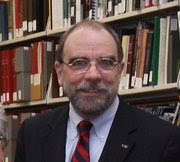The loss of a good friend: John Horton
John Horton was a good friend of the Cleveland State University Library in general and Special Collections in particular, so it was a sad surprise to learn of his death recently. He had been in a gradual decline for years -- aren't we all? -- but he had an appointment to meet with us on the 27th and the little bout of pneumonia he was battling didn't seem that severe. Still, when you're in your 90s, perhaps there is no such thing as a "little" bout of pneumonia.Mr. Horton was a retired executive from Cleveland Cliffs and was responsible for several donations of funds and archival materials from Cliffs. He was active in a number of maritime history societies and was a great source of information about the history of the Great Lakes shipping industry. He would occasionally take us to lunch at the Cleveland Yacht Club, where the line of boats tied up a the docks formed a classy backdrop for discussions on how to promote wider appreciation of the commercial value and history of the lakes.
But it was the history the Marquis de Lafayette and his relations with the early American leaders like Washington and Jefferson that had captivated him in recent years. He had befriended the late Rene de Chambrun, the last male descendant of Lafayette's, and through him broadened his appreciation of French-American history. Through his control of the family's voluminous papers of Lafayette, Chambrun was able to obtain permission from the Library of Congress for Cleveland State to acquire a copy of their microfilms of the Lafayette manuscripts, which films at the time only resided in Washington. This is now our Marquis de Lafayette Microfilm Collection.
Perhaps his most enduring contribution was his creation of the French-American Endowment Fund, the income from which goes to strengthening Cleveland State's holdings in French-American history and the history of the Great Lakes. The meeting on the 27th that we had scheduled was to introduce Mr. Horton to our new volunteer, Tony Snyder, who is examining and organizing over a hundred boxes of books and papers donated by Mr. Horton when he moved into an assisted living facility. That donation will form the nucleus of important collections in those areas, which will be augmented by his endowment fund in the coming years. The fund is open to further contributions and has already doubled in size, to nearly $100,000 since its formation.
There will be a memorial service for Mr. Horton as some future date, but all around us in Special Collections are our own memorials to him, including the material he has donated or underwritten. But it's really a loss that we won't have Mr. Horton himself around to enjoy the new materials with and to hear his stories of the Great Lakes.


<< Home